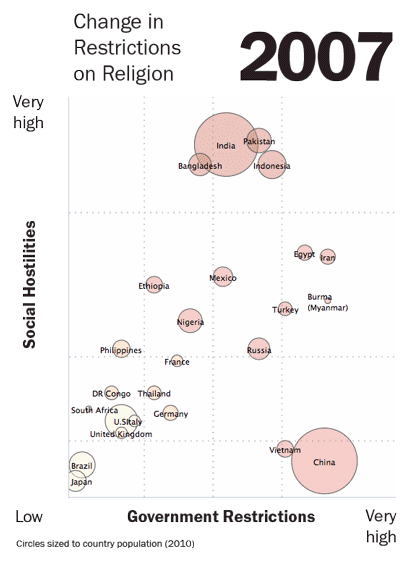
Levels of religious restrictions and hostilities among the world’s 25 most populous countries — where more than 5 billion people live — vary tremendously, from some of the lowest in the world (South Africa) to among the very highest (Indonesia).
Burma (Myanmar), Egypt, Pakistan and Russia also had some of the highest levels of religious restrictions, according to a new study from the Pew Research Center, using 2013 data (the most recent year analyzed). In these countries, both the government and society at large impose numerous limits on religious beliefs and practices.
In Burma, for example, Buddhist residents in Kyawpadaung Township tried to prevent Muslims from living in the area, displaying signs that said the town had been “purified” of Muslims. And in Pakistan, the government continued to enforce laws designed to marginalize the minority Ahmadiyya community, including laws that make it difficult for members of the community to vote or obtain passports and other legal documents if they do not renounce their faith. Ahmadis see themselves as a Muslim sect, but many Pakistanis do not view them as Muslims.
When we analyzed restrictions imposed by government, China, the world’s largest country by population, had the highest level of restrictions. For example, police in eastern Tibet beat a former Buddhist monk to death after he was found to have recordings of speeches by the Dalai Lama, who has a history of tensions with the Chinese government.
Looking at social hostilities involving religion, India, the second-largest country by population, had the highest level. Religious hostilities against people who have converted from Hinduism to Christianity continued to result in tensions, “reconversion” attempts and violent attacks, according to the U.S. Department of State’s annual International Religious Freedom report.
In Turkey, government restrictions in 2013 rose to a very high level for the first time since 2007. The government imposed new limits on religious minorities; for example, members of evangelical Protestant churches and the Church of Jesus Christ of Latter-day Saints (Mormon Church) reported arbitrary police action and government surveillance.
The United States was among the countries where social hostilities increased between 2012 and 2013, in part because two brothers influenced by Muslim extremists detonated bombs at the Boston Marathon in April 2013, killing three people and injuring hundreds. (The surviving brother is currently standing trial.)
Social hostilities also rose in Bangladesh after a young Hindu student was accused of insulting the Prophet Muhammad and a mob violently attacked a predominantly Hindu village, burning more than two dozen homes and beating the student’s father in the town square.
Several very populous countries have relatively low levels of restrictions and hostilities – including Brazil, the Democratic Republic of the Congo, Japan, the Philippines and South Africa. South Africa was in the lowest category for both social hostilities and government restrictions.
The United Kingdom, where government restrictions decreased from a moderate to a low level in 2013, was the only country among the 25 most populous that had a significant decrease in its level of government restrictions on religion. Among the reasons were fewer restrictions on those practicing Scientology – including a Supreme Court ruling that said Scientology should be regarded as a religion and that the British government should therefore recognize weddings that take place in Scientology chapels.
For details on the sources and methodology of this analysis, and to explore an interactive showing changes in restrictions in the world’s 25 most populous countries from 2007-2013, see the full report.